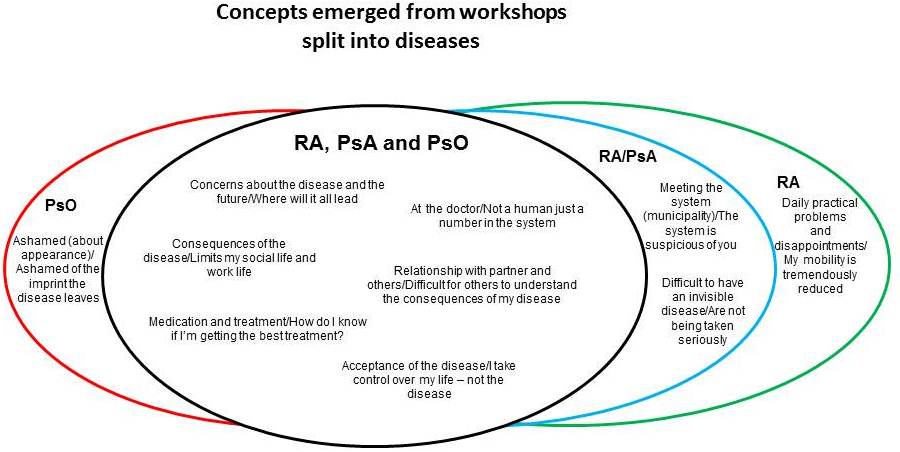Session Information
Session Type: ACR Poster Session B
Session Time: 9:00AM-11:00AM
Identifying generic and specific patients’ perspectives on disease- and treatment-related issues in rheumatoid arthritis, psoriatic arthritis, and psoriasis: a qualitative concept mapping study
T.S. Jørgensen1, L. Klokker1, H. Gudbergsen1, S.F. Thomsen2, R. Christensen1, H. Bliddal1, and L.E. Kristensen1. 1The Parker Institute, Copenhagen University Hospital, Bispebjerg and Frederiksberg, Copenhagen, Denmark 2Department of Dermatology, Bispebjerg Hospital & Department of Biomedical Sciences, University of Copenhagen, Copenhagen, Denmark.
Background/Purpose: Considering the patients’ perspectives is necessary to promote patient empowerment and adherence to treatment, and thereby optimizing disease management. Specifically, it is essential to identify issues of importance to patients to help guide selection of value based treatment targets and outcomes. The aim of this study was to qualitatively explore disease- and treatment-related issues and concerns experienced by patients with rheumatoid arthritis (RA), psoriatic arthritis (PsA), and psoriasis (PsO), and to rate the clinical importance of these. A secondary aim was to explore whether these factors were generic or disease specific.
Methods: Concept Mapping, a structured group process, was used to identify and organize disease- and treatment-related issues and concerns. Data were elicited through a nominal group technique and then organized using participants’ themes, multidimensional scaling, cluster analysis, participant validation, rating of clinical importance, and thematic analyses, to generate a conceptual model of disease-related concerns experienced in patients with RA, PsA, and PsO.
Results: 17 RA patients, 8 PsA patients, and 9 PsO patients contributed to generating the conceptual model. 8 RA clusters, 7 PsA clusters, and 7 PsO clusters, with each cluster having sub-clusters, emerged from the workshops producing 292 RA statements, 160 PsA statements, and 187 PsO statements. Some clusters were generic: ‘concerns about the disease and the future’, ‘consequences of the disease’, ‘relationship with partner and others’, ‘acceptance of the disease’, ‘medication and treatment’, and ‘at the doctor’ (Figure). Specific clusters were; for RA: ‘Daily practical problems and disappointments’, for RA/PsA: ‘Meeting the system (municipality)’ and ‘Difficult to have an invisible disease’, and for PsO: ‘Ashamed (about appearance)’ (Figure). RA and PsA patients ranked “Meeting the system (municipality)” as being the most important concept, whereas PsO patients ranked “Ashamed (about appearance)” as being the most important concept.
Conclusion: Patients across chronic inflammatory diseases agreed largely on the concepts, with a few of them being disease specific. The relative ranking of importance showed considerable differences, highlighting the importance of patient involvement. These data offer new knowledge to guide selection of clinically relevant and value based treatment targets and outcomes for patients impacted by RA, PsA and PsO. Acknowledgements: This study was funded by The Oak foundation, Roche (Denmark) and Novartis (Denmark). Disclosure of Interest: T.S. Jørgensen has received research grants paid to institute: Roche and Novartis; L. Klokker has no disclosures of interest to this project; H. Gudbergsen has no disclosures of interest to this project; S.F. Thomsen has received research grants and speaker fee from Novartis; R. Christensen has no disclosures of interest to this project; H. Bliddal has received research grants paid to institute: Roche and Novartis; L.E. Kristensen has received research grants paid to institute: Roche and Novartis Figure:
To cite this abstract in AMA style:
Jørgensen TS, Klokker L, Gudbergsen H, Thomsen SF, Christensen R, Bliddal H, Kristensen LE. Identifying Generic and Specific Patients’ Perspectives on Disease- and Treatment-Related Issues in Rheumatoid Arthritis, Psoriatic Arthritis, and Psoriasis: A Qualitative Concept Mapping Study [abstract]. Arthritis Rheumatol. 2016; 68 (suppl 10). https://acrabstracts.org/abstract/identifying-generic-and-specific-patients-perspectives-on-disease-and-treatment-related-issues-in-rheumatoid-arthritis-psoriatic-arthritis-and-psoriasis-a-qualitative-concept-mapping-stud/. Accessed .« Back to 2016 ACR/ARHP Annual Meeting
ACR Meeting Abstracts - https://acrabstracts.org/abstract/identifying-generic-and-specific-patients-perspectives-on-disease-and-treatment-related-issues-in-rheumatoid-arthritis-psoriatic-arthritis-and-psoriasis-a-qualitative-concept-mapping-stud/

